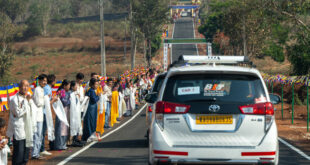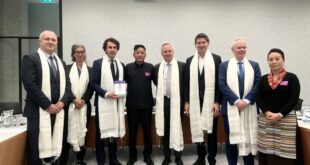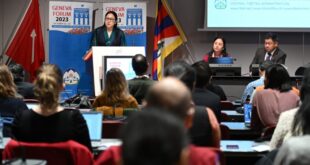It was on this 2nd day of September in 1960 that the fruit of His Holiness the Dalai Lama’s gift of the excellence of the democratic system of government to the Tibetan people was realized with the establishment of the Tibetan parliament which was made up of elected representatives from all the three provinces as well as the religious orders of Tibet. And so, on this universal calendar day in the Tibetan Royal Year 2150, when we mark the 63rd anniversary of that momentous occasion, the Tibetan Parliament-in-Exile, with the humility of a profound gratitude to His Holiness, wishes to extend its greetings and good wishes to all the Tibetan people, governments and parliaments that have extended support for Tibet and the Tibetan people, to the Tibet support groups, as well as to the entirety of the public in the international community that aspire peace, fairness and truth.
The democratic system of government is based on a political ideology that does not differentiate people on the basis of the question whether a person is strong or weak, rich or poor, male or female, or on the basis of their race or lineage, and so forth with regard to their status in society. Rather, it postulates the founding of a society in which everyone is seen as equal, viewed through the prism of the generality or commonality of everyone. Such a system is seen as being based on an ideology that reflects the primacy of the will of the people. It does not bear saying that in the records of the histories of many nations, people have had to make many great sacrifices for the purpose of finally realizing the establishment of a system of government that is based on this great ideology. However, in the case of the Tibetan democracy, we never felt the need to strive for realizing or achieving the present system of democracy, it was bestowed upon us by our pre-eminent leader, His Holiness the Great Fourteenth Dalai Lama, on the basis of the importance He attached to His great foresight and concern for the wellbeing of His people.
Immediately on assuming political and spiritual leadership of Tibet in 1950, His Holiness embarked on a quest to modernize the system of working of the Tibetan society, for which purpose He newly established in 1952 a reform office. But before this office could work out its full order of plans of action, Communist Chinese invaders launched an armed aggression on Tibet and soon overran the entire territory, thus creating a huge obstacle to the implementation of His reform agenda. However, as soon as He reached the holy land of India in exile, His Holiness, in tandem with the establishment of a Tibetan government in exile, oversaw the establishment in 1960 of the Tibetan parliament with its members elected by the Tibetan people. In 1961, He publicized a document outlining the salient features of a democratic constitution for a future free Tibet. He followed it up, in 1963, with the proclamation of a democratic constitution for a future free Tibet. This was followed, in 1991, by His Holiness taking further action to transform the Tibetan parliament into a true legislative body. Pursuant to this development, His Holiness, on the 28th of June in 1991, granted His assent to the Charter of Tibetans in exile following its adoption by the 11th Tibetan Parliament-in-Exile. His Holiness thereby transformed the Tibetan government in exile into a charter-based body which functions in accordance with a modern democratic system. Further, in the year 2001, a major step was taken in continuing the development of Tibetan democracy with a decision for the Kalon Tripa being elected directly by the Tibetan people. Later, in the year 2011, His Holiness transferred to the leadership elected directly by the Tibetan people the entirety of His political and government powers to make them effective representatives who have a mandate to serve the interests of both those living in Tibet and in exile. And so, we owe a debt of gratitude to His Holiness the Dalai Lama that the Central Tibetan Administration has today become a fully functioning government system within a democratic framework in every aspect.
Although we have been refugees over the last more than six decades, the leaders of Tibetan government in exile or the Central Tibetan Administration are being directly elected by the Tibetan people in diaspora, like the major independent and progressive democratic countries. Similarly, the local bodies under the CTA, scattered all over the world also exercise democratic electoral system in appointing their representatives – such as the members of the Local Tibetan Assemblies, a section of the Tibetan Settlement Offices, and members of the Regional Tibetan Freedom Movement. Besides, the manner of taking decisions in these bodies is subject to the democratic procedure of majority vote. These bear ample testimony to the gradual progress and development of Tibetan democracy achieved through the meticulous process of refinement in the way a goldsmith tests the purity of gold with regard to the system of Tibetan democracy, its basic framework, and in the manner of the people’s participation in it since His Holiness the Dalai Lama granted to the general Tibetan populace the noble gift of democracy. And so, when in future, the just cause of Tibet prevails and the fortunate era of sunshine dawns on Tibetan people being able to return to their homeland, the best contribution we can make in the exchange of experiences with those who had remained in Tibet would obviously be the democracy that we practice in exile.
Among the numerous features of the democratic system, one of the more important is the guaranteeing of respect for basic human rights and adhering to the rule of law. There is no person who does not consider his personal freedoms and rights to be important. In the same way, it is equally important that the freedoms and rights of other people, and likewise, their desire to be governed by rule of law, should also be respected. This, while, no doubt, being true, is also fundamental for maintaining harmony in society. In particular, what Tibetans living in exile need to bear in mind is that during their period of living as refugees in foreign countries, they should value the opportunity they enjoy of their freedom and equality by directing their efforts towards the realization of a system of Tibetan democracy which is characterized by attributes of a modern democratic system as well as ethical values rooted in Tibetan culture more than ever before. This has become vital.
When it comes to talking about the situation in Tibet today, it does not bear mentioning that not only are the Tibetan people living there deprived of their democratic freedoms, they also lack even the most fundamental of human rights recognized and proclaimed by the United Nations Organization. Pursuing a series of hard line policies during the past many decades, the Communist Chinese government has subjected the Tibetan people to all manners of hardship on successive occasions that affected every aspect of their day-to-day living conditions. And this was not all. It has even been engaged in implementing a policy to obliterate without a trace the linguistic heritage, religion, culture, traditions and customs, natural environment and so forth which are the defining characteristics of the Tibetan people and their nation. This entailed the indiscriminate arrest or forcible taking away of Tibetan people on false incriminations, their detention and imprisonment, beating and torture, and all others sorts of ill-treatment which continue to be rampant to this day. The government of China is presently engaged in a policy to forcibly assimilate more than a million Tibetan children in boarding schools which has been especially set up for this purpose. This was the reason why recently, on the 22nd of August this year, the Department of State of the United States government announced the imposition of visa sanctions on a section of Chinese leaders involved in this policy. The Tibetan Parliament-in-Exile welcomes this action from the United States government. Still, it bears emphasizing that the situation wherein the government of China continues to carry out a policy to Sinicize the Tibetan people, religion, culture, and nation and to trample on the human rights of the Tibetan people in Tibet remain an abiding cause for great anxiety.
On the 10th of August in 2023, three United Nations human rights experts – the Special Rapporteur on the situation of human rights defenders Ms. Mary Lawlor; the Special Rapporteur on freedom of assembly and association Mr. Clément Nyaletsossi Voule; and the Special Rapporteur on human rights obligations relating to the enjoyment of a safe, clean, healthy and sustainable environment Mr. David Boyd – issued a joint statement. This statement questioned the government of China for its long term imprisonment of nine Tibetan environment activists whose names it mentioned. “If China is committed to tackle the impacts of climate change, it should refrain from persecuting environmental human rights defenders and release all nine immediately,” the experts said. The Tibetan Parliament-in-Exile wishes to express its appreciation to these United Nations human rights experts. Along with it, we wish to appeal to the United Nations as well as governments across the world to pressure and appeal to the government of China to grant freedom to the people in Tibet to engage in initiative and activities on issues of respect for their religious, cultural, linguistic, and fundamental human rights.
As the current, 17th Tibetan Parliament-in-Exile nears the end of the second year of its term, its members have undertaken visit and inspection tours to the settlements and other areas where Tibetan people have settled, for which purpose settlement destinations were allocated to them at the start of the parliamentary term. Along with undertaking their visits and inspections, the members have, as and when occasions arose, spoken to the Tibetan public about the noble activities and services being undertaken by His Holiness the Dalai Lama and developments in political activities; they also inspected the state of wellbeing of the Tibetan public. By these means, the members of the Tibetan Parliament-in-Exile have acted, and continue to act, as a sort of bridge between the Tibetan public and their administration. Also by these means, a significant number of grievances and problems of the Tibetan public have been solved.
A large number of political activities of various types have been undertaken, and continues to be undertaken, by the Tibetan Parliament-in-Exile for furthering the fundamental cause of Tibet. These include, and have included, lobbying for support for the Tibetan struggle in a number of countries, with focus on members of parliament of India and other countries, leaders of governments in their respective countries, Tibet support groups and their members through meetings and making of requests for support through various programmes, and also by means of organizing a meeting of the World Parliamentarians’ Convention on Tibet. In order to ensure further improvement in the parliamentary conduct of the members of the Tibetan Parliament-in-Exile, a number of training and strategy meetings were held on successive occasions. Local Assemblies in the Tibetan settlement areas are also important institutions within the democratic framework of the Tibetan people living in exile. Hence, in order to further and improve success in their functioning, the Tibetan Parliament-in-Exile has undertaken, and continues to undertake, programmes to impart training to the members of the Local Tibetan Assemblies at their various locations from time to time. This year, a new initiative was launched, and continues to be carried out, to spread awareness of the issue of Tibet among the Indian youths in different states of the country, with the main focus being on college and university students, for which purpose visit allocations of states were made for the members of the Tibetan Parliament-in-Exile. To sum up, the Tibetan Parliament-in-Exile wishes to apprise the Tibetan public about the activities it has undertaken, and continues to undertake, to the best of its means, directed at efforts to realize the just cause of Tibet and towards overcoming the grievances and solving the problems of the general Tibetan public.
The Tibetan democracy being practiced by us in exile is the result of a vision long held by His Holiness the Dalai Lama and is based on the foundation of truth and fairness, and of ethical conduct. It is therefore established on the recognition of the values of democracy, on the foundation of which we have continued to pool whatever capabilities we possessed to cumulatively enrich it with our experiences in our pursuit of the democratic way. Nevertheless, it bears pointing out that from the start of the year 2020 following the outbreak of the Covid-19 global pandemic in the central Chinese city of Wuhan, the entire world got plunged into hardship and suffering, engulfed by its spread. This had a great deleterious effect on our Tibetan community in exile too, including the fact that the Tibetan Parliament-in-Exile was unable to hold its regular session in accordance with the laws and rules governing it. But now, following an agreement reached during the 5th session of the 17th Tibetan Parliament-in-Exile, resolution No. 2023/17/5/5 was adopted under which a Rules and Regulation Review Committee made up of five members of the Parliament was constituted. The mandate of this committee is to review the laws, and the rules and regulations of the Central Tibetan Administration, and submit its report and recommendations to the Parliamentary Secretariat by the end of Feb 2024. As such, the committee is already fully immersed in carrying out this task. The Tibetan Parliament-in-Exile remains hopeful that by means of this approach, greater clarity will be achieved in carrying out its works in accordance with the laws and the rules and regulations governing the conduct of its business and affairs.
It is solely on account of the kindness of and the debt of gratitude we owe to His Holiness the Dalai Lama, the unsurpassable leader of the Tibetan people, that there has been a groundswell of assistance and support for Tibet and the Tibetan people from governments, parliaments, organizations and associations, as well as private individuals from countries across the world, including especially India, the United States of America, and across Europe. To all of them, the Tibetan Parliament-in-Exile takes the opportunity provided by this occasion to express its immense gratitude.
Finally, we pray that His Holiness the Great 14th Dalai Lama, the refuge of the Tibetan people for this life as well as hereafter, and our unsurpassable leader, may continue to live for ten thousand eons; that, on this basis, all His great and noble desires may be seen fulfilled with spontaneity and without obstacles; and that the noble path of Tibetan democracy may continue to develop and progress and, on that basis, the just cause of the Tibetan people may definitely prevail in all speediness.
The Tibetan Parliament-in-Exile
2 September 2023




